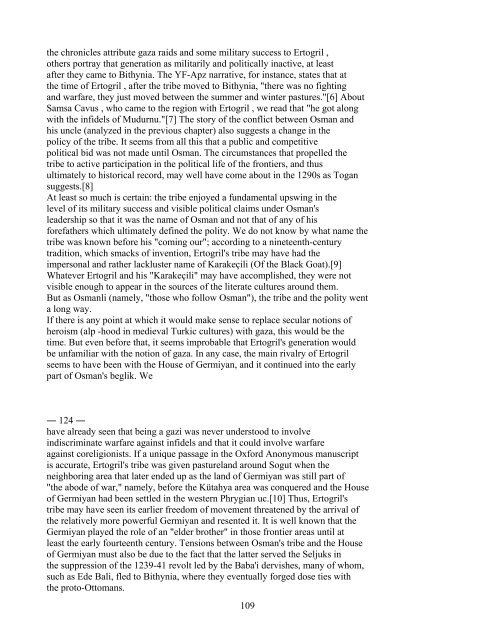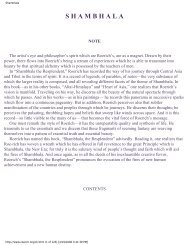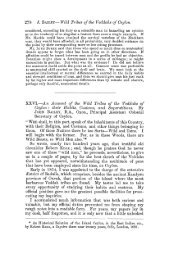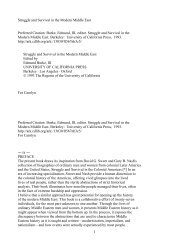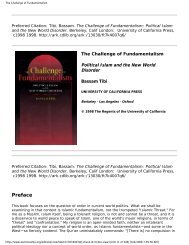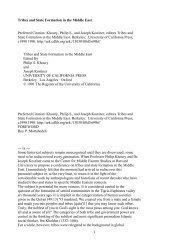Between Two Worlds Kafadar.pdf
Between Two Worlds Kafadar.pdf
Between Two Worlds Kafadar.pdf
Create successful ePaper yourself
Turn your PDF publications into a flip-book with our unique Google optimized e-Paper software.
the chronicles attribute gaza raids and some military success to Ertogril ,<br />
others portray that generation as militarily and politically inactive, at least<br />
after they came to Bithynia. The YF-Apz narrative, for instance, states that at<br />
the time of Ertogril , after the tribe moved to Bithynia, "there was no fighting<br />
and warfare, they just moved between the summer and winter pastures."[6] About<br />
Samsa Cavus , who came to the region with Ertogril , we read that "he got along<br />
with the infidels of Mudurnu."[7] The story of the conflict between Osman and<br />
his uncle (analyzed in the previous chapter) also suggests a change in the<br />
policy of the tribe. It seems from all this that a public and competitive<br />
political bid was not made until Osman. The circumstances that propelled the<br />
tribe to active participation in the political life of the frontiers, and thus<br />
ultimately to historical record, may well have come about in the 1290s as Togan<br />
suggests.[8]<br />
At least so much is certain: the tribe enjoyed a fundamental upswing in the<br />
level of its military success and visible political claims under Osman's<br />
leadership so that it was the name of Osman and not that of any of his<br />
forefathers which ultimately defined the polity. We do not know by what name the<br />
tribe was known before his "coming our"; according to a nineteenth-century<br />
tradition, which smacks of invention, Ertogril's tribe may have had the<br />
impersonal and rather lackluster name of Karakeçili (Of the Black Goat).[9]<br />
Whatever Ertogril and his "Karakeçili" may have accomplished, they were not<br />
visible enough to appear in the sources of the literate cultures around them.<br />
But as Osmanli (namely, "those who follow Osman"), the tribe and the polity went<br />
a long way.<br />
If there is any point at which it would make sense to replace secular notions of<br />
heroism (alp -hood in medieval Turkic cultures) with gaza, this would be the<br />
time. But even before that, it seems improbable that Ertogril's generation would<br />
be unfamiliar with the notion of gaza. In any case, the main rivalry of Ertogril<br />
seems to have been with the House of Germiyan, and it continued into the early<br />
part of Osman's beglik. We<br />
― 124 ―<br />
have already seen that being a gazi was never understood to involve<br />
indiscriminate warfare against infidels and that it could involve warfare<br />
against coreligionists. If a unique passage in the Oxford Anonymous manuscript<br />
is accurate, Ertogril's tribe was given pastureland around Sogut when the<br />
neighboring area that later ended up as the land of Germiyan was still part of<br />
"the abode of war," namely, before the Kütahya area was conquered and the House<br />
of Germiyan had been settled in the western Phrygian uc.[10] Thus, Ertogril's<br />
tribe may have seen its earlier freedom of movement threatened by the arrival of<br />
the relatively more powerful Germiyan and resented it. It is well known that the<br />
Germiyan played the role of an "elder brother" in those frontier areas until at<br />
least the early fourteenth century. Tensions between Osman's tribe and the House<br />
of Germiyan must also be due to the fact that the latter served the Seljuks in<br />
the suppression of the 1239-41 revolt led by the Baba'i dervishes, many of whom,<br />
such as Ede Bali, fled to Bithynia, where they eventually forged dose ties with<br />
the proto-Ottomans.<br />
109


